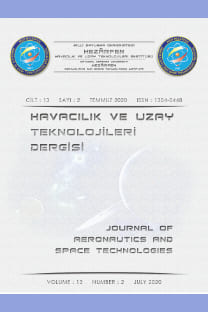Clutter Learning Based LS Method for Buried Target Detection in GPR Images
YNR Görüntülerinde Gömülü Hedef Tespitini için Kargaşa Öğrenme Tabanlı LS Metodu
___
[1] D. J. Daniels, Ground Penetrating Radar. IEE, London, U.K. (2004).[2] A.B. Yoldemir, and M. Sezgin, “A least squares approach to buried object detection using ground penetrating radar.” IEEE Sensors Journal, Vol. 11, No. 6, pp. 1337-1341, 2011.
[3] E. Temlioglu, I. Erer and D. Kumlu, “A least mean square approach to buried object detection in ground penetrating radar,” In IEEE International Geoscience and Remote Sensing Symposium (IGARSS), pp. 4833-4836, July 2017.
[4] B.P.A. Rohman and M. Nishimoto, “GPR Target Signal Enhancement Using Least Square Fitting Background and Multiple Clustering of Singular Values,” Progress In Electromagnetics Research, Vol. 83, pp.123-132, 2019.
[5] X. Song.; D. Xiang; K. Zhou and Y. Su, “Improving RPCA-based clutter suppression in GPR detection of antipersonnel mines.” IEEE Geosci. Remote Sens. Letters, Vol. 14, No. 8, pp. 1338-1342, 2017.
[6] F. Abujarad, Ground Penetrating Radar Signal Processing for Landmine Detection, PhD Thesis, Otto- Von-Guericke University Magdeburg, Germany (2007).
[7] P.K. Verma, A. N. Gaikwad, D. Singh et al. “Analysis of clutter reduction techniques for through wall imaging in UWB range.” Progress In Electromagnics Res B., Vol. 17, pp. 29-48, 2009.
[8] D. Kumlu and I. Erer, “Clutter Removal Techniques in Ground Penetrating Radar for Landmine Detection: A Survey.” In Operations Research for Military Organizations, IGI Global, pp. 375–399, 2019.
[9] D. Kumlu and I. Erer, “A comparative study on clutter reduction techniques in GPR images.” In International Conference on Electrical and Electronics Eng., pp.23– 328, April 2017.
[10] D. Kumlu and I. Erer, “Clutter removal in GPR images using nonnegative matrix factorization,” Journal of Electromagnetic Waves and Applications, Vol. 32, No. 16, pp. 2055–2066, 2018.
[11] M. P. Masarik, J. Burns; B. T. Thelen; J. Kelly and T. C. Havens, “GPR anomaly detection with robust principal component analysis.” In Detection and Sensing of Mines, Explosive objects, and Obscured targets XX, May 2015.
[12] L. Liu, Q. Chen, Y. Han, H. Xu, J. Li, and B. Wang, “Improved Clutter Removal by Robust Principal Component Analysis for Chaos Through-Wall Imaging Radar.” Electronics, Vol. 9, No. 1, pp .25, 2020.
[13] H. Abdi, The Method of Least Squares. Thousand Oaks, CA: Sage, 2010.
[14] D. Kumlu and I. Erer, “Combining Clutter Learning with LS for Improved Buried Target Detection in GPR.” In 9th International Conference on Recent Advances in Space Technologies (RAST), pp. 607-611, June 2019.
[15] E. J. Candès, X. Li; Y. Ma and J. Wright, “Robust principal component analysis?.” Journal of the ACM, Vol. 58, No. 1, pp. 1-37, 2009.
[16] Xu, Y., Wu, Z., Xiao, F., Zhan, T. and Wei, Z, “A target detection method based on low-rank regularized least squares model for hyperspectral images.” IEEE Geoscience and Remote Sensing Letters, Vol. 13, No. 8, pp.1129-1133, 2016.
[17] C. Warren, A. Giannopoulos and I. Giannakis, “gprMax: Open source software to simulate electromagnetic wave propagation for ground penetrating radar.” Computer Physics Comm, Vol. 209, pp. 163-170, 2009.
[18] Real GPR data. Vrije Univ. Brussel (VUB), accessed on Sep. 01, 2011. [Online]. Available: http://www.minedet.etro.vub.ac.be
[19] J. Kim, G. Caire and A.F. Molisch, “Quality-aware streaming and scheduling for device-to-device video delivery.” IEEE/ACM Transactions on Networking, Vol. 24, No. 4, pp. 2319-2331, 2015.
- ISSN: 1304-0448
- Yayın Aralığı: 1
- Başlangıç: 2003
- Yayıncı: Dr. Öğr. Üyesi Fatma Kutlu Gündoğdu
Genelleştirilmiş Doğrudan Güdüm ile Üç Boyutlu Formasyon Uçuş
The General-Purpose Modeling, Analysis, and Implementation of Software Architectures
Türkiye’nin İlk 1,5 kW Hall Tipi Elektrikli İtki Sistemi Performans Özellikleri
Demet ULUŞEN, Banu ÇİÇEK AYDIN, Yusuf YURTTAŞ, Barış ÇAL, Andrii TSYBULNYK, Sergii NEUGODNIKOV, Oleksii CHERKUN, Seda GÜLLÜ
Serpil Ustebay, Ilkay YELMEN, Metin ZONTUL
Kenar Koruyan Filtreler ve İçsel Görüntü Ayrıştırma ile Gürbüz Hiperspektral Öznitelik Çıkartımı
Nano and Micro Satellites as the Pillar of the “New Space” Paradigm
Numerical Investigation of Propeller - Frame Arm Interaction in Hovering Flight
Three-Dimensional Formation Flight with Generalized Explicit Guidance
